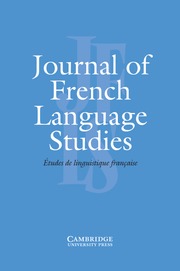Article contents
Social class, cluster simplification and following context: Sociolinguistic variation in word-final post-obstruent liquid deletion in French1
Published online by Cambridge University Press: 22 November 2013
Abstract
This article is a quantitative study of the variable deletion of post-obstruent /l/ and /R/ in word-final obstruent-liquid clusters (OLC) in French (capable [kapab(l)], cidre [sid(ʁ)]). The analysis of over a thousand tokens extracted from a corpus of interviews gathered in Nancy and Rennes shows that the reduction of word-final OLCs is a stable sociolinguistic marker in northern, standardised metropolitan French. Patterns of stylistic and social stratification in age, gender, and social class and interaction with following phonological context are attested, but OLC reduction does not appear to be an ongoing change. It is argued that the data provide further evidence of variable morpheme-final consonant clusters as a ‘primitive’ feature of vernacular dialects.
- Type
- Articles
- Information
- Copyright
- Copyright © Cambridge University Press 2013
Footnotes
I acknowledge with gratitude the financial support of the British Academy and the Arts and Humanities Research Council which has facilitated different aspects of the research reported here. Thanks are also due to Aidan Coveney, Zsuzsanna Fagyal-Le Mentec and the three anonymous JFLS reviewers for their detailed and constructive remarks. Any remaining shortcomings are, of course, solely my responsibility.
References
REFERENCES
- 6
- Cited by


